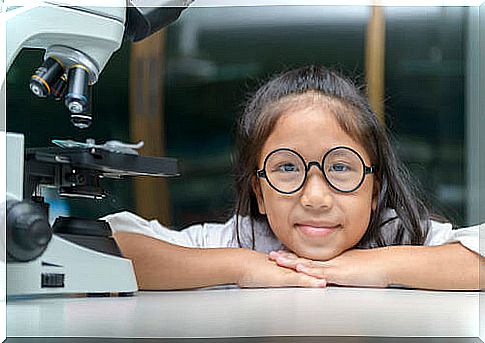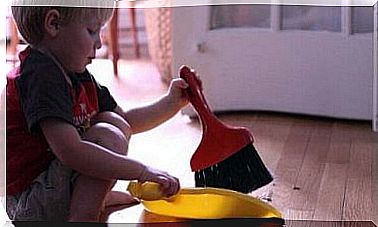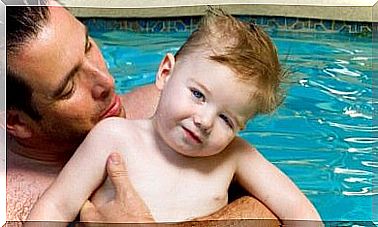How To Stimulate Scientific Thinking In Children

Stimulating scientific thinking in children is very important. Your children will benefit not only in their school career, but also in their daily life and in their training as people. Developing reasoning and logic will help them solve problems and adapt to the situations they will face in life.
When we talk about scientific thinking, we are not referring only to things related to science (mathematics, nature, biology, engineering, medicine, geometry, etc.), but also to the ability to be autonomous and to solve the problems of everyday life.
Why is it important to stimulate scientific thinking in children?
As we said earlier, stimulating scientific thinking in children is very important. When they are small, children’s brains are in full development. Anything that provides them with cognitive stimulation facilitates their development both as students and as individuals. Let’s find out what are the advantages of stimulating scientific thinking in children.

- Enhance learning to solve problems in real situations.
- Increase children’s ability to observe and analyze what is happening around them.
- Improve children’s reasoning skills and stimulate the thinking of more complex ideas.
- It enhances the logical-deductive skills of children and allows them to learn strategies to find solutions to problems.
- Improves the relationship of children with the environment around them and the way they perceive it.
- Help children find their own learning method.
- Improves the perception of spaces and the relationship of children with the physical environment (shapes, parts, etc.).
These are some of the benefits of stimulating scientific thinking in children. Thanks to this way of thinking they will be people capable of facing and solving difficult situations. In addition, they will be able to analyze things from different points of view and have a global view of the world in which they live.
What must be taken into account to stimulate scientific thinking in children?
In order for the development of scientific thought to be adequate, some essential aspects must be taken into account. Here are a few:
- Using scientific thinking in the child’s daily life.
- Use logic to solve complicated situations.
- Provide the child with the necessary skills and techniques to be able to observe and analyze the environment around him and act accordingly.
- Encourage children to find solutions even if they make mistakes. They have to find various solutions and if they don’t work, they have to find others. Making mistakes is a learning opportunity. This is what we need to teach our children.
Tips to stimulate scientific thinking in children
Scientific thinking helps children to relate facts, ideas, causes and effects. If we use some simple practices in our daily life, we will help our children to develop this kind of logical and deductive thinking. Here are some suggestions:
Encourage your child’s curiosity about the world
We need to encourage our children to be curious and understand how things and objects around them work. Children should be allowed to touch objects and experiment to understand how they work, what they are for, etc.
We must allow our children to touch and handle objects, materials, clothes, toys. Obviously, making sure they don’t get hurt.
Through sight and touch, children will identify the differences between the various objects in terms of colors, shapes and sizes and will try to understand what their peculiar characteristics and functions are. As children grow up, you can do home experiments to explain cause and effect to them.
Ask the children questions to stimulate their interest in things
There are very curious children who ask a lot of questions and touch everything and others who seem to have no curiosity. With the latter we must try to awaken their interest by asking them questions about the world around them. Furthermore, we must encourage them to find an explanation for everything they do not understand.
Encourage children to solve problems
As long as it is not dangerous, we must let the children look for solutions to various problems on their own. Let them understand how the objects you have at home work. Of course, always under your supervision and following your advice.

Use play and imagination
You can offer your children simple challenges to overcome. For example, you can start a story and ask them to continue the story by explaining what happens to the protagonists, to invent new ones, etc.
Use stories to stimulate scientific thinking in children
Stories and tales can be a great tool for stimulating scientific thinking in children. At first, parents will read a story to the children and then ask them questions to develop children’s understanding and reasoning.
When the children are older, it is very likely that every time they read a story they will try to find answers to the doubts they have and consult other books for more information.
Discreetly direct the way children learn
When your children are faced with a problem they can’t solve, don’t give them the solution right away. Give the children clues or ask them questions that can help them find a solution through reasoning. In this way, they will, independently, find the solution.
As you have seen, it is important for parents to stimulate children’s scientific thinking. This will help them not only in the school environment (which is certainly important), but also to become people capable of solving problems on their own.
Remember that parents are guides in their children’s learning journey. With patience, work and love, our children can become good people in many areas.









